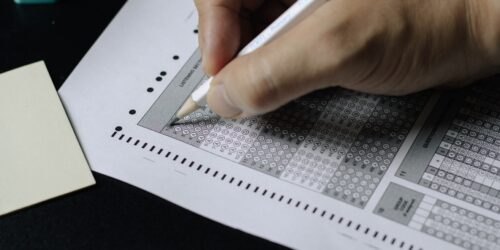
Honour Pledges for Assessments
By Cory Scurr, Academic Integrity Coordinator, and Elan Paulson, Teaching and Learning Consultant
In adapting course assessments for online synchronous delivery, you may be considering how to discourage plagiarism or cheating. This tip provides information about the honour pledge and shares some alternatives to promoting academic integrity in your course.
What is the Honour Pledge
A Statement of Commitment to Academic Integrity, commonly known as an honour pledge, is a written contract in which students express their commitment to academic honesty. Some institutions refer to it as an affirmation statement (Harvard, 2020) or a statement of commitment (see below).
Before collecting assessments, professors may invite students to write out a pledge, or sign and submit an honour pledge form, as a way to discourage academic violation. An LMS may have an option to add an honour pledge upon electronic submission (Brock, 2020).
Some faculty have found benefits to using honour pledges (McCabe, 2016), including affirming a sense of pride and integrity in student work. However, using an honour pledge may have some drawbacks as well.
Honour pledges may be used in any mode of course delivery.
Benefits
- Demonstrates a proactive approach to minimize academic violation by addressing cheating before assignments are due or a quiz/test/exam is written.
- Provides an opportunity for an explicit conversation about academic integrity (if discussed beforehand).
- Attempts to personalizes the commitment to academic integrity by having students actually sign and submit a form.
- Demonstrates faculty commitment to upholding academic integrity.
Limitations
- Is not legally binding in any way (students don’t have to sign it).
- May not promote a culture of trust, and can undermine the values of pride and integrity that the faculty member hopes to develop independently in their course.
- Faculty must administer and manage honour pledge documentation.
- Research suggests that, without being nested within a culture of academic integrity, honour pledges are not overly effective in discouraging cheating. See LoSchiavo & Shatz (2011), Konheim-Kalkstein, Stellmack, & Shilkey (2008).
Using Honour Pledges
- Open a conversation about academic integrity: describe the importance of completing one’s own work and citing any ideas or works created by others, and the negative consequences of violation for the student, the program, and Conestoga College.
- Describe the pledge document as a way for the class to promote high academic standards.
- Read the full document with students, and answer any questions.
- Have students download a copy to sign and return to the professor.
- Remind students about the contract just before assignments are due.
Alternatives to the Honour Pledge
- Weave conversations about academic integrity with students throughout a course.
- Co-create with students a class academic integrity promise document.
- Teach about and provide resources for academic citation in your discipline/industry.
- Do a practice activity with students about sources, plagiarism, and collusion.
- Develop alternate assessments that are difficult to plagiarize or benefit from collusion.
- Incorporate into class assessments (like quizzes or exams) an integrity-based question (for marks):
- Example from Pre-Health Chemistry Course: “Briefly explain why it is important in this course, and in your future career as a health professional, to act with honesty, integrity, and fairness, even when no one is watching? Take a few minutes to write a considerate response, in complete sentences, to earn full marks.”
- Provide grace days for assignment submission.
Conestoga’s Statement of Commitment to Academic Integrity
Click the button below to access and download the Statement on Commitment to Academic Integrity for use with assessments.
Questions and Support
Contact the Academic Integrity Coordinator.
References
Brock University. (2020). Assignments (Sakai). Available at http://kumu.brocku.ca/sakai/Assignments
Harvard University (2020). About the Honor Code. Available at https://honor.fas.harvard.edu/about
Konheim-Kalkstein, Y. L., Stellmack, M. A., & Shilkey, M. L. (2008). Comparison of honor code and nonhonor code classrooms at a non-honor code university. Journal of College and Character, 9, 1-13.)
LoSchiavo, F., & Shatz, M. (2011). “The Impact of an Honor Code on Cheating in Online Courses” MERLOT Journal of Online Learning and Teaching Vol. 7, No. 2.
McCabe, Donald. (2016). “Cheating and Honor: Lessons from a Long-Term Research Project”, in Tracey Bretag Ed., Handbook of Academic Integrity, Springer Reference, Singapore.






